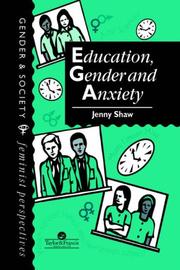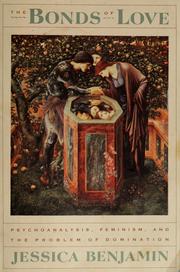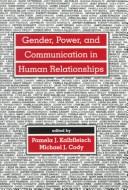| Listing 1 - 10 of 11 | << page >> |
Sort by
|
Book
ISBN: 0140219692 Year: 1978 Publisher: Middlesex Penguin Books
Abstract | Keywords | Export | Availability | Bookmark
 Loading...
Loading...Choose an application
- Reference Manager
- EndNote
- RefWorks (Direct export to RefWorks)
Marriage --- Unmarried couples --- Interpersonal relations --- Cohabitation --- Domestic partners --- Living together --- Couples --- Common law marriage --- Free love --- Married life --- Matrimony --- Nuptiality --- Wedlock --- Love --- Sacraments --- Betrothal --- Courtship --- Families --- Home --- Honeymoons --- Human relations --- Interpersonal relationships --- Personal relations --- Relations, Interpersonal --- Relationships, Interpersonal --- Social behavior --- Social psychology --- Object relations (Psychoanalysis) --- Marriage. --- Unmarried couples. --- Interpersonal relations. --- Sociology --- Sociology of the family. Sociology of sexuality --- Relationship man and women --- Book

ISBN: 0748401024 0748401016 Year: 1995 Publisher: London ; Bristol, PA : Taylor & Francis,
Abstract | Keywords | Export | Availability | Bookmark
 Loading...
Loading...Choose an application
- Reference Manager
- EndNote
- RefWorks (Direct export to RefWorks)
Affective and dynamic functions --- Sociology of the family. Sociology of sexuality --- Sociology --- Educational psychology --- Study methods --- Curriculum development --- Didactics --- Educational systems. Teaching systems --- Teaching --- Kindergarten --- Primary education --- Secondary education --- Great Britain --- Anxiety --- Object relations (Psychoanalysis) --- Sex differences in education --- Sex discrimination in education --- Feminism --- Gender --- Single-sex education --- Academic performance --- Teachers --- Education --- Curriculum --- Choice of study --- Book --- Emotions
Book
ISBN: 9781541675575 9781541675568 Year: 2023 Publisher: New York, N.Y. Seal Press
Abstract | Keywords | Export | Availability | Bookmark
 Loading...
Loading...Choose an application
- Reference Manager
- EndNote
- RefWorks (Direct export to RefWorks)
"From Joan of Arc to Queen Elizabeth I, to Harriet Tubman and Susan B. Anthony, to Sally Ride and Jennifer Aniston, history is full of women without children. Some chose to forgo reproduction in order to pursue intellectually satisfying work-a tension noted by medieval European nuns, 1970s women's liberationists, and modern professionals alike. Some refused to bring children into a world beset by famine, pollution, or climate change. For others, childlessness was involuntary: infertility has been a source of anguish all the way back to the biblical Hannah. But most women without children didn't--and don't--perceive themselves as either proudly childfree or tragically barren. Seventeenth century French colonists in North America, struggling without the kind of community support they enjoyed in their mother country, found themselves postponing children until a better moment that, for many of them, never arrived. It is women like these-whose ambivalence throughout their child-bearing years inevitably makes their choice for them-that make up the vast majority of millennials without children in the United States. Drawing on deep archival research and her own experience as a woman without children, historian Peggy O'Donnell shows modern women who are struggling to build lives and to figure out whether those lives allow for children that they are part of a long historical lineage-and that they are certainly not alone"--
Childlessness --- Women --- Interpersonal relations --- Human relations --- Interpersonal relationships --- Personal relations --- Relations, Interpersonal --- Relationships, Interpersonal --- Social behavior --- Social psychology --- Object relations (Psychoanalysis) --- Family size --- Social aspects --- Psychology --- Psychological aspects --- Mental health --- Sociology of the family. Sociology of sexuality --- History --- Family --- Children --- Voluntary childlessness --- Involuntary childlessness --- Motherhood --- Fertility --- Book
Book
ISBN: 9780745671079 0745671071 Year: 2012 Publisher: Cambridge Polity
Abstract | Keywords | Export | Availability | Bookmark
 Loading...
Loading...Choose an application
- Reference Manager
- EndNote
- RefWorks (Direct export to RefWorks)
Few of us have been spared the agonies of intimate relationships. They come in many shapes: loving a man or a woman who will not commit to us, being heartbroken when we're abandoned by a lover, engaging in internet searches, coming back lonely from bars, parties, or blind dates, feeling bored in a relationship that is so much less than we had envisaged - these are only some of the ways in which the search for love is a difficult and often painful experience. Despite the widespread and almost collective character of these experiences, our culture insists they are the result of faulty or insufficiently mature psyches. For many, the Freudian idea that the family designs the pattern of an individual's erotic career has been the main explanation for why and how we fail to find or sustain love. Psychoanalysis and popular psychology have succeeded spectacularly in convincing us that individuals bear responsibility for the misery of their romantic and erotic lives. The purpose of this book is to change our way of thinking about what is wrong in modern relationships. The problem is not dysfunctional childhoods or insufficiently self-aware psyches, but rather the institutional forces shaping how we love. The argument of this book is that the modern romantic experience is shaped by a fundamental transformation in the ecology and architecture of romantic choice. The samples from which men and women choose a partner, the modes of evaluating prospective partners, the very importance of choice and autonomy and what people imagine to be the spectrum of their choices: all these aspects of choice have transformed the very core of the will, how we want a partner, the sense of worth bestowed by relationships, and the organization of desire. This book does to love what Marx did to commodities: it shows that it is shaped by social relations and institutions and that it circulates in a marketplace of unequal actors. -- Publisher description.
Love --- Interpersonal relations --- Man-woman relationships --- Mate selection --- Human relations --- Interpersonal relationships --- Personal relations --- Relations, Interpersonal --- Relationships, Interpersonal --- Social behavior --- Affection --- Psychological aspects. --- Social aspects. --- Courtship --- Dating (Social customs) --- Marriage brokerage --- Social psychology --- Object relations (Psychoanalysis) --- Emotions --- First loves --- Friendship --- Intimacy (Psychology) --- Interpersonal attraction. --- Social influence. --- Love. --- Psychological aspects --- Social aspects --- Developmental psychology --- Affective and dynamic functions --- Primary groups --- Sociology of the family. Sociology of sexuality

ISBN: 0394757300 0394551338 9780394757308 9780394551333 Year: 1988 Publisher: New York [N.Y.]: Pantheon books,
Abstract | Keywords | Export | Availability | Bookmark
 Loading...
Loading...Choose an application
- Reference Manager
- EndNote
- RefWorks (Direct export to RefWorks)
Why do people submit to authority and derive pleasure even others have over them? What is the appeal of domination and submission, and why are they so prevalent in erotic life? Why is it so difficult for men and women to meet as equals? Why, indeed, do they continue to recapitulate the positions of master and slave? In The Bonds of Love, noted feminist theorist and psychoanalyst Jessica Benjamin explains why we accept and perpetuate relationships of domination and submission. She reveals that domination is a complex psychological process which ensnares both parties in bonds of complicity, and shows how it underlies our family life, our social institutions, and especially our sexual relations, in spite of our conscious commitment to equality and freedom.
Depth psychology --- Freud, Sigmund --- Dominance (Psychology) --- Interpersonal relations --- Psychoanalysis --- Psychoanalysis and feminism --- Recognition (Psychology) --- Sex role --- Gender role --- Sex (Psychology) --- Sex differences (Psychology) --- Social role --- Gender expression --- Sexism --- Memory --- Feminism and psychoanalysis --- Feminism --- Psychology --- Psychology, Pathological --- Human relations --- Interpersonal relationships --- Personal relations --- Relations, Interpersonal --- Relationships, Interpersonal --- Social behavior --- Social psychology --- Object relations (Psychoanalysis) --- Social hierarchy (Psychology) --- Control (Psychology) --- Social groups --- Gender roles --- Gendered role --- Gendered roles --- Role, Gender --- Role, Gendered --- Role, Sex --- Roles, Gender --- Roles, Gendered --- Roles, Sex --- Sex roles --- Gender identity --- Psychoanalytic interpretation --- Sex differentiation --- Dominance-Subordination --- Gender Identity --- Psychoanalytic Interpretation --- Sex Differentiation --- Interpersonal Relations --- Gender --- Power --- Sado-masochism --- Oppression of women --- Book

ISBN: 0803952082 0803952074 Year: 1994 Publisher: London Sage
Abstract | Keywords | Export | Availability | Bookmark
 Loading...
Loading...Choose an application
- Reference Manager
- EndNote
- RefWorks (Direct export to RefWorks)
Sociology of the family. Sociology of sexuality --- Social psychology --- Families. --- Interpersonal relations. --- Feminist theory. --- Famille --- Études sur le genre. --- Psychologie sociale --- Sociologie --- Psychologie sociale. --- Sociologie. --- Families --- Feminist theory --- Interpersonal relations --- Human relations --- Interpersonal relationships --- Personal relations --- Relations, Interpersonal --- Relationships, Interpersonal --- Social behavior --- Feminism --- Feminist philosophy --- Feminist sociology --- Theory of feminism --- Family --- Family life --- Family relationships --- Family structure --- Relationships, Family --- Structure, Family --- Philosophy --- Social aspects --- Social conditions --- Object relations (Psychoanalysis) --- Social institutions --- Birth order --- Domestic relations --- Home --- Households --- Kinship --- Marriage --- Matriarchy --- Parenthood --- Patriarchy --- Violence --- Singles --- Relationships --- Sexuality --- Friendships --- Book --- Relationship mother and child

ISBN: 041531030X 0415310318 1134388829 1299054293 1280074728 0203414411 9780203414415 9781134388776 9781134388813 9781134388820 9780415310307 9780415310314 Year: 2004 Publisher: London ; New York : Routledge,
Abstract | Keywords | Export | Availability | Bookmark
 Loading...
Loading...Choose an application
- Reference Manager
- EndNote
- RefWorks (Direct export to RefWorks)
This extraordinary book exposes the strange world of the parea--a lesbian secret society based in a small-town bar outside Athens, whose members meet clandestinely.
Lesbians --- Dating (Social customs) --- Interpersonal relations --- Female friendship --- Lesbiennes --- Amours --- Relations interpersonnelles --- Amitié féminine --- Social networks. --- Identity. --- Sexual behavior. --- Réseaux sociaux --- Identité --- Comportement sexuel --- Social networks --- Sexual behavior --- Amitié féminine --- Réseaux sociaux --- Identité --- Friendship between women --- Friendship in women --- Women's friendship --- Human relations --- Interpersonal relationships --- Personal relations --- Relations, Interpersonal --- Relationships, Interpersonal --- Social behavior --- Dates (Social engagements) --- Female gays --- Female homosexuals --- Gay females --- Gay women --- Gayelles --- Gays, Female --- Homosexuals, Female --- Lesbian women --- Sapphists --- Women, Gay --- Women homosexuals --- Developmental psychology --- Sexology --- Sociology of the family. Sociology of sexuality --- Greece --- Friendship --- Social psychology --- Object relations (Psychoanalysis) --- Manners and customs --- Gays --- Women --- Gender --- Homosexuality --- Identity --- Female homosexuality --- Book

ISBN: 0805814043 Year: 1995 Publisher: Hillsdale, N.J. Erlbaum
Abstract | Keywords | Export | Availability | Bookmark
 Loading...
Loading...Choose an application
- Reference Manager
- EndNote
- RefWorks (Direct export to RefWorks)
Primary groups --- 316.77 --- #SBIB:309H021 --- #SBIB:309H515 --- #SBIB:309H505 --- Communicatiesociologie --- Intra- en interpersonele communicatie --- Literatuurwetenschap, literatuursociologie --- Code en boodschap: psychologische, psycho-analytische benadering --- Communication --- Interpersonal communication. --- Interpersonal relations. --- Man-woman relationships. --- Sex differences (Psychology) --- Sex differences. --- Sex differences (Psychology). --- 316.77 Communicatiesociologie --- Interpersonal communication --- Interpersonal relations --- Man-woman relationships --- Sex (Psychology) --- Female-male relationships --- Male-female relationships --- Men --- Men-women relationships --- Relationships, Man-woman --- Woman-man relationships --- Women --- Women-men relationships --- Mate selection --- Human relations --- Interpersonal relationships --- Personal relations --- Relations, Interpersonal --- Relationships, Interpersonal --- Social behavior --- Social psychology --- Object relations (Psychoanalysis) --- Sex differences --- Relations with women --- Relations with men --- Finances --- Body language --- Power --- Relationship man and women --- Masculinity --- Sexuality --- Sexually transgressive behavior --- Stereotypes --- Language use --- Television --- Féminité --- Blackness --- Book --- Consumption
Book
ISBN: 9067163120 9789067163125 Year: 1985 Publisher: Antwerpen,
Abstract | Keywords | Export | Availability | Bookmark
 Loading...
Loading...Choose an application
- Reference Manager
- EndNote
- RefWorks (Direct export to RefWorks)
interactieprocessen --- Sociological theories --- Social problems --- intermenselijke relaties --- Social psychology --- gezinspsychologie --- gezinssociologie --- contraceptie --- man-vrouw relatie --- gezinsbeleid --- socialisatie --- Interpersonal relations --- #SBIB:316.356.2H1230 --- C6 --- maatschappij --- analyse --- Z316.7 --- Z==92/11 --- 316.6 --- Cultuur --- Ethiek --- Opvoeding --- Recht --- Relaties --- Samenleving --- Relatievormen: sociologie --- 347.62 <493> --- 316.356.2 --- #gsdbP --- Human relations --- Interpersonal relationships --- Personal relations --- Relations, Interpersonal --- Relationships, Interpersonal --- Social behavior --- Object relations (Psychoanalysis) --- 159.92 --- 392.5 --- 179.7 --- 159.91 --- 301.17 --- Gezins- en verwantschapsvormen: algemeen --- Opvoeding, onderwijs, wetenschap --- Huwelijksrecht. Huwelijksvoorwaarden. Huwelijksformaliteiten. Nietigheid, aanvechtbaarheid van het huwelijk. Rechten en plichten van echtgenoten--België --- Gezinssociologie --- Interpersonal relations. --- Pedagogiek en onderwijskunde --- gezinspedagogiek --- samenlevingsvormen --- 316.356.2 Gezinssociologie --- 347.62 <493> Huwelijksrecht. Huwelijksvoorwaarden. Huwelijksformaliteiten. Nietigheid, aanvechtbaarheid van het huwelijk. Rechten en plichten van echtgenoten--België --- gezinspedagogiek. --- Boek. --- Bundel. --- Relaties. --- Sociale problemen. --- Sociale psychologie. --- Sociologische theorieen. --- interactieprocessen. --- intermenselijke relaties. --- Relationships --- Book --- Edited volume
Book
ISBN: 9028900993 Year: 1975 Volume: vol *24 Publisher: Antwerpen : Nederlandsche Boekhandel,
Abstract | Keywords | Export | Availability | Bookmark
 Loading...
Loading...Choose an application
- Reference Manager
- EndNote
- RefWorks (Direct export to RefWorks)
lichaamstaal --- Didactic strategies --- Personality development --- seksuele vorming --- 268.741 --- Nonverbal communication --- Self-actualization (Psychology) --- #GBIB:SMM --- #GGSB: Jongeren --- #GGSB: Seksuele ethiek --- #GSDBP --- #SMV:België --- #SMV:Nederland --- Seksualiteit --- 415.2 --- bewegingsexpressie --- seksualiteit --- seksuele opvoeding --- bio-energetica --- creativiteit --- lichamelijke expressie --- psychologie --- Growth, Personal --- Personal growth --- Self-improvement --- Self-realization (Psychology) --- Humanistic psychology --- Mental health --- Motivation (Psychology) --- Non-verbal communication --- Communication --- Expression --- Moraal en catechese. Catechese en seksuele opvoeding --- Sexualité --- Zintuiglijke indrukken en waarnemingen --- 392.6 --- 37.03 --- 615.88 --- 007 --- Communication in sex. --- Interpersonal relations. --- Nonverbal communication. --- Sex. --- 268.741 Moraal en catechese. Catechese en seksuele opvoeding --- Self-actualization (Psychology). --- Communication in sex --- Interpersonal relations --- Sex --- Human relations --- Interpersonal relationships --- Personal relations --- Relations, Interpersonal --- Relationships, Interpersonal --- Social behavior --- Social psychology --- Object relations (Psychoanalysis) --- Gender (Sex) --- Human beings --- Human sexuality --- Sex (Gender) --- Sexual behavior --- Sexual practices --- Sexuality --- Sexology --- Jongeren --- Seksuele ethiek --- Body --- Sexuality education --- Book --- Creativity
| Listing 1 - 10 of 11 | << page >> |
Sort by
|

 Search
Search Feedback
Feedback About UniCat
About UniCat  Help
Help News
News